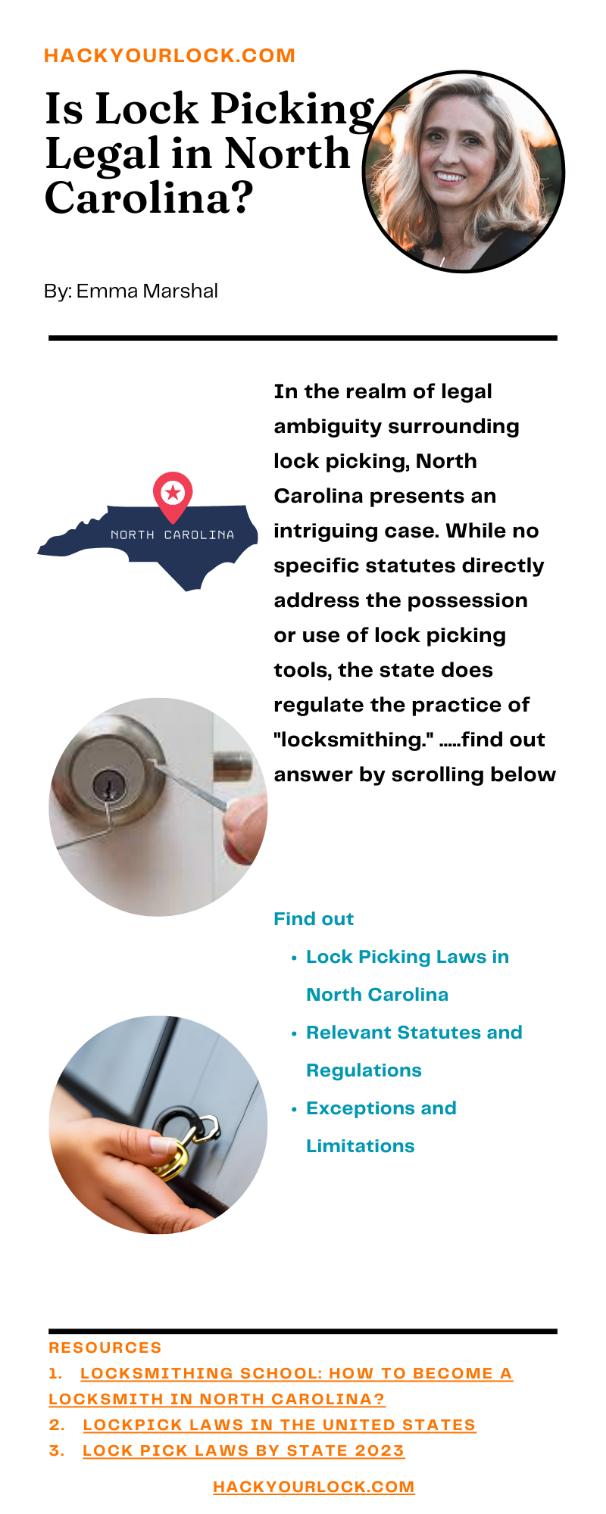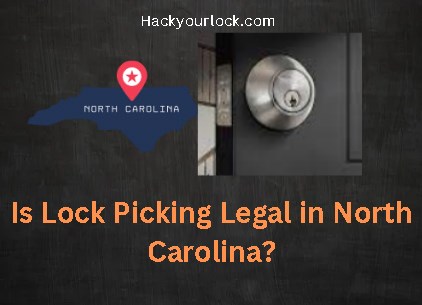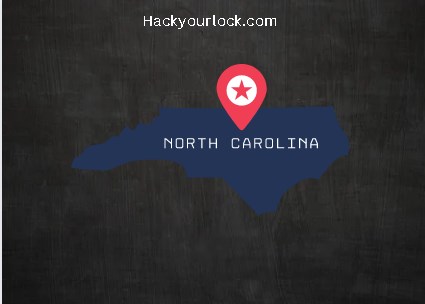The art of lock picking, often associated with mystery and intrigue, has captured the fascination of many. But amidst the curiosity lies a crucial question specifically: Is lock picking legal in the state of North Carolina?
In North Carolina, laws and regulations govern the practice of this skill, clarity is sought regarding its legality.
In this article, we delve into the legal landscape surrounding lock picking in North Carolina, exploring statutes, precedents, and implications to provide a comprehensive understanding of its status within the state’s legal framework.

Contents
Is Lock Picking Legal in North Carolina?

In the realm of legal ambiguity surrounding lock picking, North Carolina presents an intriguing case. While no specific statutes directly address the possession or use of lock picking tools, the state does regulate the practice of “locksmithing.”
This distinction raises important questions about the legality of lock picking activities within the state’s boundaries. To navigate this complex legal landscape, it’s essential to examine the statutes, regulations, and precedents that shape the practice of lock picking in North Carolina.
Answer to “Is Lock Picking Legal in Montana?” according to Lockpick Laws In the United States is the fact that no specific laws concerning possession exist, but “locksmithing” is regulated.
Lock Picking Laws in North Carolina
North Carolina State Laws on Lock Picking

Lock picking laws in North Carolina revolve around the question, “Is lock picking legal in North Carolina?” Lock picking laws in North Carolina are governed by specific statutes which are related to locksmithing.
Relevant Statutes and Regulations
Here is the information about relevant statutes and regulations regarding lock picking laws in North Carolina presented in a table format:
| Statute/Regulation | Description |
| N.C. Gen. Stat. § 74D-1 et seq. | The North Carolina General Statutes governing locksmithing, which includes provisions related to licensing, training, and regulation. |
| N.C. Admin. Code tit. 12, ch. 4, subch. 12B | Administrative Code outlining the rules and requirements for locksmith licensure, including training programs and examination criteria. |
| N.C. Gen. Stat. § 14-86 | Statute addressing the offense of “breaking or entering buildings with intent to commit felony or larceny therein,” potentially applicable to unauthorized lock picking activities. |
Is lock picking legal in North Carolina should become more clear from conditions of legality and illegality.
Conditions under Which Lock Picking is Considered Legal or Illegal in North Carolina
Legal:
Lock picking may be considered legal in North Carolina when performed by individuals who are licensed locksmiths and adhere to the regulations outlined in N.C. Gen. Stat. § 74D-1 et seq. and N.C. Admin. Code tit. 12, ch. 4, subch. 12B. These regulations typically require locksmiths to undergo training, obtain proper licensure, and follow specific procedures when providing locksmith services.
Illegal:
Lock picking is likely considered illegal in North Carolina when performed by individuals who do not hold a valid locksmith license or engage in unauthorized activities that violate the provisions of N.C. Gen. Stat. § 14-86, which addresses offenses related to breaking and entering with criminal intent. Unauthorized possession of lock picking tools with the intent to commit a crime may also constitute illegal activity under North Carolina law.
There is a comprehensive article on Is lock picking illegal in the US for detailed information on all states in this regard.
Following table summarizes the key points from North Carolina Code – General Statutes § 74F-3., in Lockpick Laws In the United States.
| Statute/Regulation | Description |
| N.C. Gen. Stat. § 74F-3 | Mandates that individuals performing locksmith services in North Carolina must possess a valid license. |
| Violation of this requirement is deemed a Class 3 misdemeanor. | |
| N.C. Gen. Stat. § 74F-4 | Defines locksmith services, including activities such as repairing, installing, and servicing locks and security devices. |
| N.C. Gen. Stat. § 74F-16 | Provides exemptions to the licensing requirement, including allowing salespersons to demonstrate locksmith tools to licensed professionals. |
| Stipulates that lock picking demonstrations must be non-compensated to avoid falling under the definition of “locksmith services.” | |
| Establishes the existence of a Locksmith Licensing Board to oversee compliance with licensing regulations. |
Exceptions and Limitations
In North Carolina, lock picking is legally permitted for licensed locksmiths, law enforcement personnel, and individuals with explicit property owner consent.
Embarking on the journey to become a locksmith in North Carolina doesn’t follow a strict set of rules, but certain keys open doors according to Locksmithing School: How to Become a Locksmith in North Carolina?
In North Carolina, a locksmith is defined as a provider of property protection services, encompassing tasks such as repairing, installing, and servicing various types of locks and security devices for compensation. Engaging in locksmith services without a proper license is considered a serious offense, punishable by law.
To become a licensed locksmith in North Carolina, individuals are required to pass a licensure examination administered by the NC Locksmith Licensing Board.
While formal certification is not mandated, acquiring training from reputable educational sources is recommended to prepare for the exam.
Aspiring locksmiths can apply for an apprentice locksmith license, provided they meet eligibility requirements such as being at least 18 years old and passing a criminal history record check.
Apprentices work under the supervision of licensed locksmiths and must pass the licensure exam within three years of starting their apprenticeship.
The apprentice license allows individuals to gain practical experience in the field, with each licensed locksmith typically permitted to supervise up to two apprentices simultaneously.
Should an apprentice change employers during their training period, their license must be transferred accordingly, subject to a fee.
Ultimately, obtaining a locksmith license in North Carolina requires a combination of practical experience, successful completion of the licensure exam, and adherence to regulatory guidelines set forth by the state’s licensing board.
Legal Consequences
Ramifications of Unlawful Lock Picking
Engaging in lock picking without proper authorization can lead to severe consequences in Montana.
Individuals caught in unauthorized lock picking activities may face criminal charges, including fines and imprisonment.
The legal system takes a firm stance to deter any potential misuse of lock picking skills for illicit purposes.
Do you want to know about similar aspects related to lock picking in other states as well? Other states like California, Arizona, Alaska, Alabama, Ohio, New York, Washington, Florida, Virginia, Colorado, Connecticut, Delaware , Georgia, Hawaii, Iowa, Idaho, Kansas, Kentucky, Louisiana, Massachusetts, Maryland, Maine, Michigan, Minnesota, Mississippi, Missouri etc. have also similar regulations.
Conclusion
In conclusion, the question “Is lock picking legal in North Carolina?” leads us through a labyrinth of statutes, regulations, and licensing requirements.
The legality of lock picking in North Carolina revolves around the regulation of locksmith services. While possessing lock picking tools is not explicitly illegal, providing locksmith services without a valid license can result in misdemeanor or felony charges.
Aspiring locksmiths must adhere to stringent licensing requirements, including training, examinations, and apprenticeships, to legally practice in the state.
Therefore, while lock picking itself may not be unlawful, unauthorized locksmithing activities carry serious legal consequences in North Carolina.
FAQ’s
- Is it legal to possess lock picking tools in North Carolina?
Yes, there are no specific laws in North Carolina prohibiting the possession of lock picking tools. However, using them to engage in unauthorized locksmith services may lead to legal repercussions.
- How can I become a licensed locksmith in North Carolina?
To become a licensed locksmith in North Carolina, you must pass a licensure examination administered by the NC Locksmith Licensing Board. It’s recommended to acquire training from reputable sources and gain practical experience through apprenticeship programs.
- Can I perform lock picking demonstrations in North Carolina without a license?
While possessing lock picking tools for demonstration purposes is not illegal, it’s essential to ensure that demonstrations are non-compensated to avoid falling under the definition of “locksmith services.” Engaging in locksmith activities without proper licensure can result in legal consequences.
